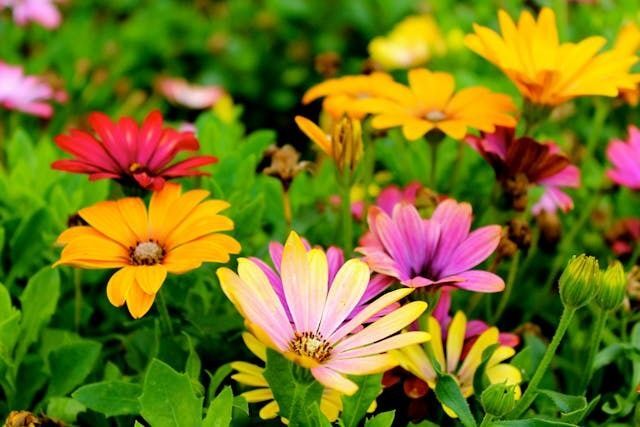
Growing a sustainable garden in Massachusetts is not only about beautifying your outdoor space—it’s a commitment to preserving local ecology. Sustainable gardening emphasizes eco-friendly practices that minimize waste, conserve water, and support biodiversity.
This approach is crucial for Massachusetts gardeners, as native plants and natural habitats encourage resilient landscapes suited to the region’s climate. In short, sustainable practices such as using native plants, creating pollinator habitats, and following permaculture principles promote soil health, reduce maintenance needs, and support essential species. By making conscious choices, you can help protect Massachusetts’ unique ecosystem while enjoying a vibrant, thriving garden.
Choosing Native Plants for a Resilient Garden in Massachusetts
Native plants are ideal for Massachusetts gardens because they have adapted to the local soil, climate, and seasonal changes over centuries. These plants—such as Black-eyed Susan, Wild Bergamot, and Milkweed—are naturally suited to thrive without the extra care often required by non-native species. Since they have evolved in this environment, native plants need less water, reducing garden upkeep and conserving a valuable resource. Their resistance to local pests also lowers the need for chemical pesticides. They are a healthier choice for the soil and surrounding wildlife.
By choosing native plants, you encourage a self-sustaining ecosystem that supports local pollinators like bees and butterflies, which is essential for maintaining plant diversity. This creates a garden that grows well in Massachusetts and promotes the area’s natural biodiversity, while requiring minimal intervention from gardeners. Native plants offer a straightforward, practical approach to sustainable gardening that aligns with the natural rhythms of the region.
Growing a Sustainable Garden in Massachusetts
Starting a sustainable garden requires thoughtful planning and care for local conditions. To create a garden that flourishes year-round and supports the environment, follow these essential steps:
● Evaluate Sunlight: Observe how much sunlight each area of your garden receives throughout the day. That will help you place plants where they’ll grow best, ensuring you don’t need extra resources to help them thrive.
● Test Soil Quality: Use a soil test kit to check pH levels and nutrients. Massachusetts soils vary, so testing helps you understand any amendments needed to support healthy plant growth.
● Choose Seasonal Plants: Select plants that align with the local seasons. Planting according to climate patterns reduces the need for intensive watering or fertilizing.
● Use Organic Fertilizers: Choose organic options like compost or bone meal to nourish plants without harmful chemicals. This method keeps soil healthier in the long run.
● Apply Mulch: Mulching helps retain moisture, control weeds, and improve soil health. Organic mulch naturally enriches the soil as it breaks down.
Taking good care of your garden can be therapeutic. It can also be a way to connect with a new environment after a relocation and find calmness. After all, a move can be stressful, especially if you are moving long-distance from one part of the state to another. Fortunately, reliable long-distance movers can make the process easier when moving across the state. They can handle everything from packing to transporting, so you have more time to focus on settling in. Once settled, creating a sustainable garden with native plants will add natural beauty to your new home, support local wildlife, and help you feel more rooted in your surroundings.
Permaculture Basics
Permaculture is a design philosophy that models gardens after natural ecosystems, making them both sustainable and self-sufficient. By mimicking the interactions found in nature, permaculture gardens use fewer resources and contribute to a healthier environment. Observing natural ecosystems is central to permaculture, as understanding the relationship between plants, soil, and local wildlife helps build a balanced garden. Another principle is recycling resources; for example, composting garden and kitchen waste return nutrients to the soil, reducing dependency on artificial fertilizers. Minimizing waste is equally important, as it encourages efficient water and organic materials use.
Beginners can start with small steps: planting perennial herbs that return each year, using mulch to retain moisture, or building raised beds to improve soil health naturally. Integrating these simple practices makes it easier to manage garden upkeep while supporting the ecosystem. Permaculture principles guide gardeners in creating a resilient, sustainable space that thrives with minimal intervention, making it an ideal approach for those seeking a greener gardening solution.
Creating Pollinator Habitats to Enhance Garden Health
Pollinators like bees, butterflies, and hummingbirds play a central role in supporting plant health and biodiversity. These creatures help plants produce seeds and fruit, which, in turn, sustain local wildlife and maintain ecological balance. If you’re growing a sustainable garden in Massachusetts, it can benefit from attracting pollinators. They naturally boost plant vitality and encourage a flourishing ecosystem.
To make your garden more pollinator-friendly, consider adding native wildflowers such as Milkweed, Coneflowers, and Asters. These plants provide nectar and pollen that attract pollinators, fostering better plant reproduction. Including shallow water sources, like small birdbaths or saucers with rocks, also supports pollinators by offering a safe place to drink and rest.
In addition, plant in clusters to create a welcoming habitat that’s easy for pollinators to find. Avoid pesticides, as these can harm beneficial insects. Supporting pollinators strengthens your garden and benefits Massachusetts’s local flora and fauna. In short, pollinator habitats contribute directly to a healthier, more balanced garden that thrives with natural support systems.
Reducing Water Use with Drought-Tolerant Techniques
Drought-tolerant gardening offers practical ways to conserve water while maintaining a thriving landscape. To reduce water use, Massachusetts gardeners can use mulch to retain soil moisture and choose plants adapted to the region’s climate. Hardy native plants, such as Little Bluestem, Butterfly Weed, and Eastern Red Cedar, are resilient in dry spells and require less watering, making them ideal for water-smart gardening.
On the other hand, collecting and using rainwater provides a free, sustainable water source. Setting up barrels to capture runoff from roofs or gutters lets you store water for irrigation during dry periods, reducing the need for city water. Drip irrigation systems are another effective solution, delivering water directly to roots and minimizing waste through evaporation. Planting in zones based on sunlight and soil moisture can also help you optimize water use by grouping plants with similar needs together.
Adding Natural Pest Control for a Healthy Ecosystem
Integrating natural pest control methods supports a healthier garden ecosystem without the use of harsh chemicals. Attracting beneficial insects, like ladybugs, lacewings, and praying mantises, helps manage common garden pests naturally. These “good bugs” consume aphids, mites, and other harmful insects, reducing pest populations without disrupting the balance of your garden. Creating insect habitats with flowers and herbs encourages these helpers to stick around.
Companion planting is another effective way to deter pests. Planting basil near tomatoes can keep tomato hornworms at bay, while marigolds near squash repel nematodes. Gardeners can create natural defenses against unwanted visitors by choosing plant combinations that discourage pests.
Physical barriers like row covers can protect delicate plants while letting air and light through. For additional protection, natural pest sprays made from garlic or neem oil can be used sparingly to target problem areas without affecting beneficial insects. These eco-friendly techniques help foster a resilient, thriving garden while protecting local biodiversity.
Conclusion
Growing a sustainable garden in Massachusetts benefits your plants and the local ecosystem. Using native plants, promoting pollinator habitats, conserving water, and practicing natural pest control, you create a garden that thrives with minimal environmental impact. Sustainable gardening reduces waste and supports biodiversity, helping wildlife and essential insects flourish. Massachusetts gardeners have a unique opportunity to design outdoor spaces that are both productive and eco-friendly. Embracing these sustainable methods fosters a healthy, resilient garden, ensuring it remains beautiful and self-sustaining for years.
If you're interested in a planting pollinator-friendly public garden, learn about our Plant Something Bee-eautiful grants.


